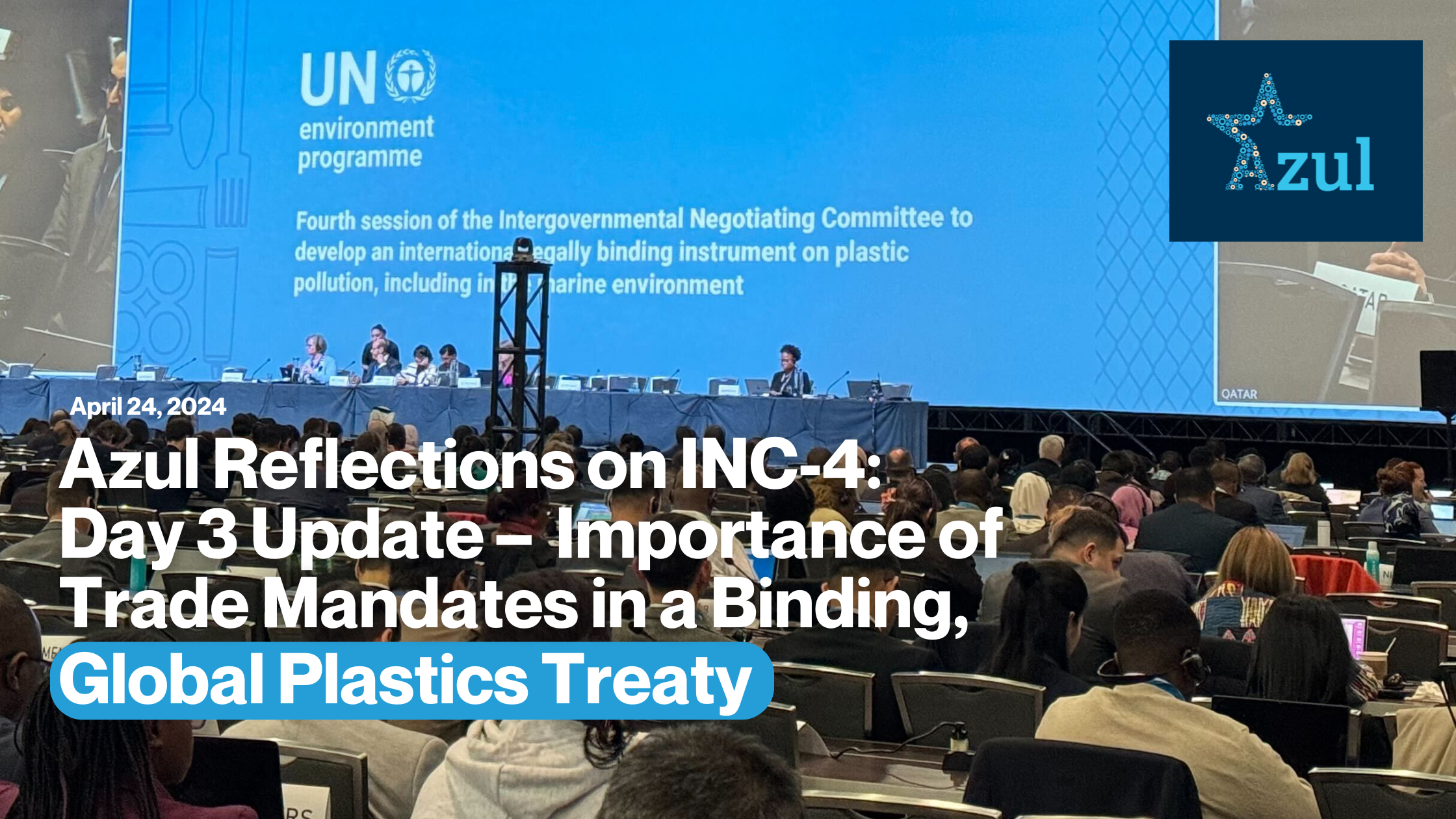Azul Reflections on INC-4, as of Day 3: Importance of Trade Mandates in a Binding, Global Plastics Treaty

Last Updated: Thursday, April 25, 2024
Editor’s note: The following details Azul’s reflections on the third day (April 25, 2024) of INC-4 negotiations. Azul’s team is presently in Ottawa, Canada in support of a legally-binding, ambitious Global Plastics Treaty. With the process being concluded for the day, we have some reflections to share.
By Roland Gonzalez Pizarro, Azul National Policy Associate
Azul believes the scope of this Global Plastics Treaty must uphold the values of preserving human rights and human health – considering the adverse impacts of plastics and plastic pollution through the whole lifecycle – including extraction to waste.
With Azul’s presence and advocacy in this international process since the first session of the International Negotiating Committee (INC) to develop an international legally binding instrument on plastic pollution, including in the marine environment, we have held firm that the achievement of all 17 Sustainable Development Goals are hindered by plastic pollution. This jeopardizes lives, livelihoods and disproportionately affects communities marginalized from source extraction to waste.
Day 1 of INC-4: Tuesday, April 23, 2024
In this round of negotiations, which run through April 29, the scope of the treaty must focus on eradicating plastic pollution in all ecosystems, reducing production of plastics, and regulating the current circulating products which negatively affect our communities.
We believe that treaty obligations should uphold the cohesion and synergy of the original United Nations Environment Assembly mandate 5/14, adopted on March 2, 2022, which asks delegates to negotiate the most ambitious treaty possible and to “end plastic pollution.”
Azul is advocating for Community Based Participatory Research (CBPR) in the treaty process as an equitable approach to understanding how plastic pollution impacts underdeveloped, underrepresented, and communities made vulnerable by plastics and plastic pollution. This cohesive understanding and form of accelerating equitable social change will allow for community knowledge of equitable remedies, alternative replacements to plastic products, and the promotion of sustainable development within those same spaces that are affected most by plastic pollution. However, common but differentiated responsibilities (CBDR) measures are a clear indication of the lack of enforceability of this instrument and the lack of measures that directly regulate domestic policy or enact national action plans via direct treaty authority.

Roland Gonzlez Pizarro, Azul National Policy Associate, at the opening plenary of INC-4. [Image Credit: Azul]
Day 2 of INC-4: Wednesday, April 25, 2024
The second day of negotiations on April 24th, was the first day of Contact Group gathering. These contact groups – which meet to address a myriad of issues and concerns by countries – are core to working through process needs and addressing text changes in treaty drafts. Subgroup 1.1, within line negotiating, was filled with substantive progress on new language on different obligations for the treaty. We appreciated the input submitted by Member Parties, which puts us closer to a binding, enforceable treaty – still, there is more work to be done.
Azul strongly encourages all parties, communities, and members of civil society from advocates to scientists, to advocate for binding, enforceable measures on trade regulation within the treaty. Stronger and higher cost tariffs will allow industry to self regulate new innovation processes with regards to port procedures, also advancing opportunities to lower Air pollution and emissions in the process. Further, regulation over transboundary movement of plastics is essential for the implementation of safe practices over the movement of products between member parties, while upholding mandatory authority like the Basel Convention and the Marrakesh agreement. Safe, and sanitary practices that avoid open dumping, waste colonialism, and focus on other equitable remedies to eradicate waste hierarchy and necessary, now.
Day 3 of INC-4: Thursday, April 25, 2024
On the third day of negotiations, held April 25, we indulged in Part I and II of the treaty within the different subgroups. As we continue to view the member parties’ stances, we can note the new text recommendations submitted to the co–facilitators. We are extremely disappointed not to see any regulation on PPP, a scope that does not include human health, principles that abide by previous mandatory authority, and do not challenge the current obstacles within the lack of regulatory authority across the full plastic lifecycle.
We remain thankful to Luis Vayas Valdivieso, Chair of the INC., treaty co-facilitators, delegates, advocates and communities for their collaboration in this unprecedented moment in history.
We have the unique opportunity to positively impact future generations – if we act now with unwavering commitment to end plastic pollution.